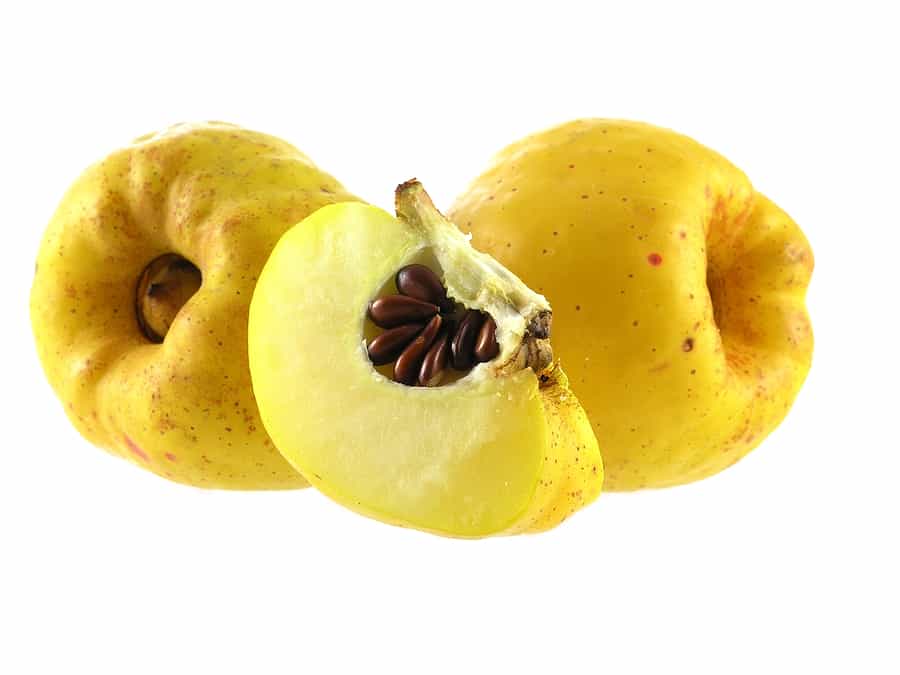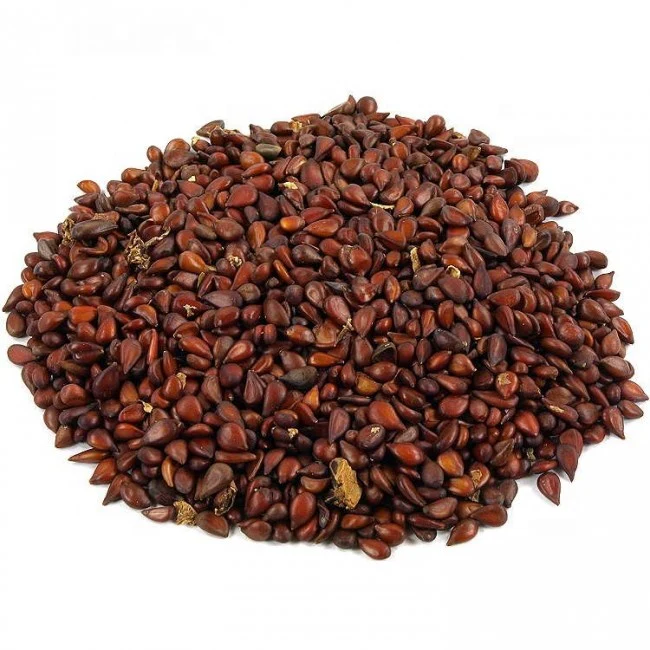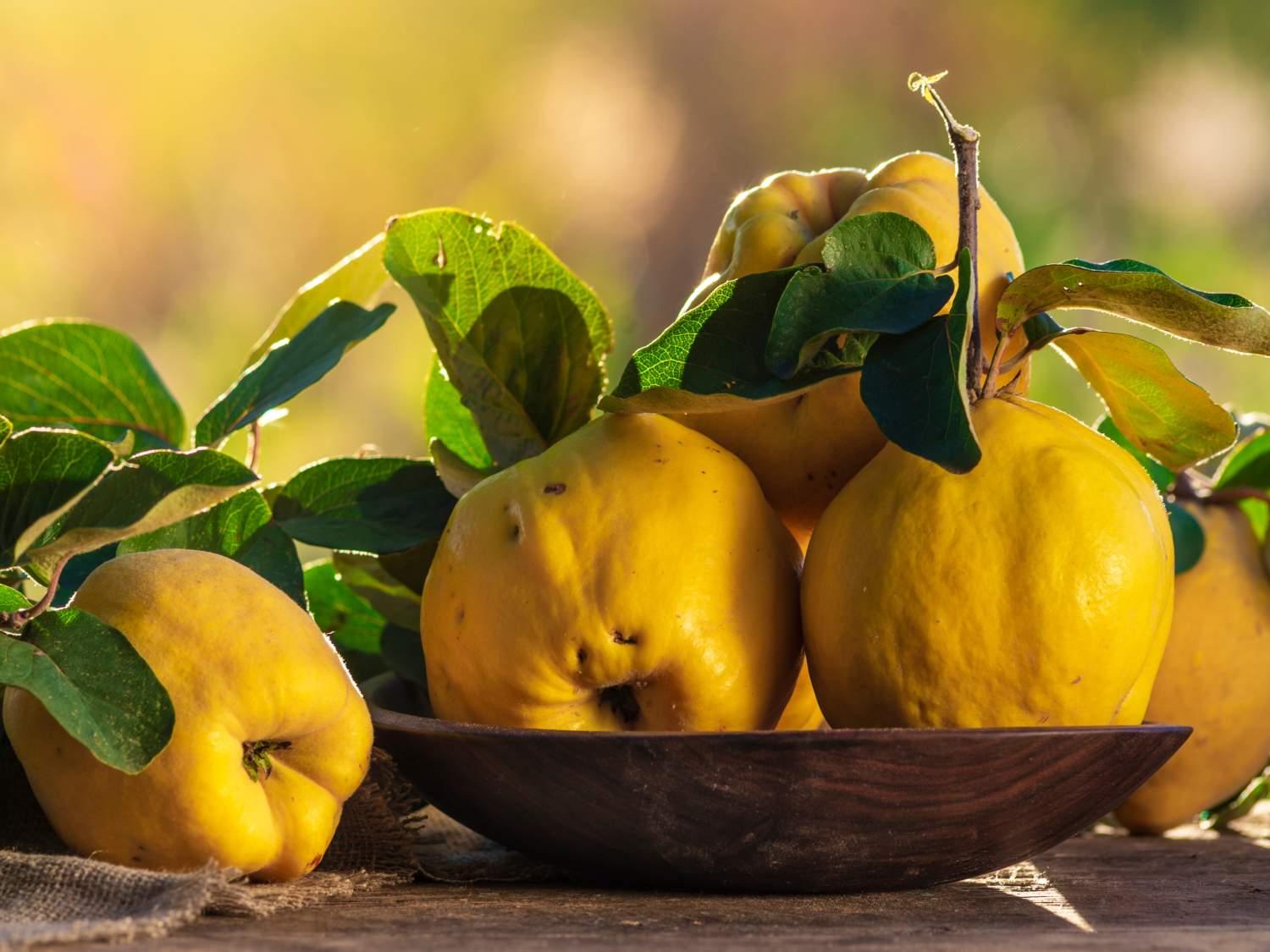INTRODUCTION

Quince seeds come from the fruit of the quince tree (Cydonia oblonga), and they have been used traditionally for both medicinal and culinary purposes. The seeds contain a mucilage that, when soaked in water, forms a gel-like substance that has been used in natural remedies for sore throats, coughs, and digestive issues. However, they also contain small amounts of amygdalin, which can release cyanide in the body, so they should be used with caution and not consumed in large quantities.
What is Quince?
Quince (Cydonia oblonga) is an ancient fruit native to different parts of Asia and the Mediterranean. It began to be cultivated in ancient Greece and Rome and is a close relative of familiar fruits such as apples and pears.
Quince fruit has an egg shape about 10-15cm long, inside the fruit has a hard core, yellow-brown spongy flesh, and fragrant. However, unlike other fruits, kumquats cannot be eaten raw, but only after being cooked or processed into jam.
Quince has been used in folk medicine for decades, but research on this plant is still in its early stages. Currently, quince is mainly used for the treatment of digestive disorders, allergies and high blood sugar.
Forms
Quince seeds can be used in various forms, each serving different purposes, especially in traditional medicine and culinary practices. Here are some of the common forms of quince seeds:
1. Raw Seeds (Whole)
Usage: Generally soaked in water to release the mucilage, which is then used for soothing irritated tissues, like in cases of sore throats or dry coughs.
Precaution: Due to the presence of amygdalin, raw seeds should not be chewed or consumed in large quantities.
2. Quince Seed Gel (Mucilage)
Preparation: Soaking quince seeds in water creates a gel-like substance from the mucilage.
Usage:
- For skincare: It can be used as a natural skin-soothing agent for burns, dry skin, and inflammation.
- For sore throat relief: The mucilage can coat the throat, providing relief from irritation.
- For coughs: It has demulcent properties that may help soothe a dry or persistent cough.

3. Quince Seed Oil
Extraction: Oil is extracted from the seeds, although less common compared to the fruit.
Usage: In skin care products, the oil has moisturizing and soothing properties. It can help with dry and damaged skin.
4. Quince Seed Tea
Preparation: Some cultures boil the seeds to prepare a mild tea that can help with digestive discomfort or respiratory issues.
Usage: The tea is sipped to soothe the stomach or alleviate coughing.
5. Powdered Quince Seeds
Preparation: Seeds are dried and ground into a powder.
Usage: The powder can be mixed into beverages or topical treatments for skin conditions or minor wounds.
6. Quince Seed Paste
Preparation: The seeds are mashed into a paste, typically after soaking, and applied topically for skin health.
Usage: Used to treat burns, scars, or as a moisturizer.
Uses
Insufficient Evidence to Rate Effectiveness for…
- Digestive disorders.
- Diarrhea.
- Coughs.
- Stomach and intestinal swelling (inflammation).
- Skin injuries, when applied to the skin.
- Swollen and painful joints, when applied to the skin.
- Eye discomfort, when applied as a lotion.
Health Benefits
Quince seeds have been valued for their health benefits, especially in traditional medicine. However, it’s important to note that most benefits are linked to their mucilage content, and the seeds should be used carefully due to their amygdalin content. Here are some notable health benefits:

Digestive Health
Quince seeds are known for their mucilage content, a gel-like substance that forms when the seeds come in contact with water. This mucilage is believed to have a soothing effect on the digestive tract, potentially alleviating issues like constipation and promoting regular bowel movements.
Skin Health
Some traditional remedies suggest that quince seed extract or oil may be used topically to promote skin health. It is believed to have moisturizing properties that can help soothe and hydrate the skin.
Hydrating and Moisturizing
Quince seeds are highly moisturizing due to the gel-like mucilage they produce when soaked in water. This gel hydrates and soothes dry skin, helps with conditions like eczema, and works as a natural conditioner for dry hair and scalp. It’s a gentle, natural remedy for skin and hair hydration.
Supports Oral Health
Quince seeds promote oral health by forming a soothing gel that relieves sore gums and mouth ulcers. Their mild antibacterial and anti-inflammatory properties help reduce irritation and support healing.
Wound Healing
Quince seeds aid in wound healing through their soothing mucilage, which forms a protective barrier over cuts, burns, and other minor wounds. This gel reduces inflammation, promotes moisture retention, and accelerates the healing process. Additionally, the seeds’ mild antibacterial properties help prevent infection, making them a natural remedy for treating skin injuries.
Antioxidant Properties
Quince seeds have antioxidant properties that help neutralize harmful free radicals, protecting cells from oxidative stress and supporting overall health. This may enhance skin vitality and reduce inflammation, contributing to better health and longevity.
Anti-inflammatory Effects
Quince seeds have anti-inflammatory effects due to their mucilage, which soothes irritated tissues. When applied topically, they can help treat skin conditions like burns and eczema, while their internal use may alleviate respiratory inflammation in conditions such as bronchitis and asthma.
Respiratory Health
Quince seeds benefit respiratory health through their soothing mucilage, which can help alleviate symptoms of respiratory conditions like bronchitis and asthma. When consumed, the mucilage coats and calms inflamed airways, reducing irritation and facilitating easier breathing. Additionally, its natural expectorant properties can help loosen mucus, promoting better airflow and relief from coughs. Overall, quince seeds serve as a gentle, natural remedy for supporting respiratory wellness.
Side Effects

While quince seeds offer various health benefits, they also come with potential side effects, particularly due to the presence of amygdalin, which can release cyanide when metabolized. Here are some side effects to consider:
- Toxicity Risk
- Allergic Reactions
- Gastrointestinal Issues
- Interactions with Medications
- Skin Irritation




